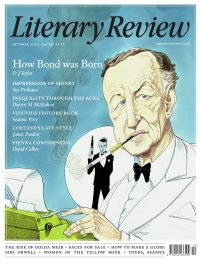Nigel Andrew
In the Beginning Was the Cosmic Bell
A Book of Noises: Notes on the Auraculous
By Caspar Henderson
Granta Books 368pp £16.99
‘This book began in wonder,’ declares Caspar Henderson in its opening sentence – and what better place to begin? This exploration of the ‘auraculous’ world of sound – the word is Henderson’s own coinage, conflating the aural and the miraculous – is full, almost indigestibly so, of wonders. The author suggests ‘jumping to whatever catches your eye first’ among the book’s forty-eight ‘entries’, or mini-chapters. ‘Have a blast. Skip a whole category if you like.’ It’s good advice, as reading the whole thing sequentially leaves the mind reeling. The expression ‘have a blast’ gives an indication of the tone of the book, as do its two epigraphs: a quotation about music from Rumi and ‘a creation story from the Guarani people, Paraguay’.
The entries in A Book of Noises are grouped into four sections: ‘Cosmophony: Sounds of Space’, ‘Geophony: Sounds of Earth’, ‘Biophony: Sounds of Life’ and ‘Anthrophony: Sounds of Humanity’. This makes sense as a way of giving shape to Henderson’s mass of material, which begins with the Big Bang and ends with silence, that vital counterpoint to sound. It also ensures that the book gets off to a mind-boggling start. Henderson describes the expanding universe reverberating ‘as if filled with countless cosmic bells’ and explains how ‘resonant transitions’ played a central part in the transmutation of atomic nuclei in the superhot cores of collapsing stars. ‘Without this musical alchemy,’ the author assures us, ‘life would not exist.’ Coming very much closer to Earth, he describes the surprising sound world of balloon flight, with the noises on the ground below uncannily clear, this aural ‘panacousticon’ as impressive as the visual panorama. A fascinating section explores the idea of ‘music of the spheres’ from its origins in the ancient world to the present day, when computer-aided ‘sonification’ can translate almost anything into audible sound, including the movement of the planets. It is even possible to work out how the human voice would sound on different planets: on Venus, apparently, we would sound ‘like bass Smurfs’ (though, as Henderson points out, we could never put this to the test, as we would be crushed and burned to a frazzle almost instantaneously).
When it comes to the sounds of Earth and the sounds of life, the book is no less mind-boggling but rather more ‘relatable’. Henderson ponders, among other things, ‘the wave of song circling the Earth as daybreak sweeps from east to west and the dawn chorus of birds begins across

Sign Up to our newsletter
Receive free articles, highlights from the archive, news, details of prizes, and much more.@Lit_Review
Follow Literary Review on Twitter
Twitter Feed
The latest volume of T S Eliot’s letters, covering 1942–44, reveals a constant stream of correspondence. By contrast, his poetic output was negligible.
Robert Crawford ponders if Eliot the poet was beginning to be left behind.
Robert Crawford - Advice to Poets
Robert Crawford: Advice to Poets - The Letters of T S Eliot, Volume 10: 1942–1944 by Valerie Eliot & John Haffenden (edd)
literaryreview.co.uk
What a treat to see CLODIA @Lit_Review this holiday!
"[Boin] has succeeded in embedding Clodia in a much less hostile environment than the one in which she found herself in Ciceronian Rome. She emerges as intelligent, lively, decisive and strong-willed.”
Daisy Dunn - O, Lesbia!
Daisy Dunn: O, Lesbia! - Clodia of Rome: Champion of the Republic by Douglas Boin
literaryreview.co.uk
‘A fascinating mixture of travelogue, micro-history and personal reflection.’
Read the review of @Civil_War_Spain’s Travels Through the Spanish Civil War in @Lit_Review👇
John Foot - Grave Matters
John Foot: Grave Matters - Travels Through the Spanish Civil War by Nick Lloyd; El Generalísimo: Franco – Power...
literaryreview.co.uk